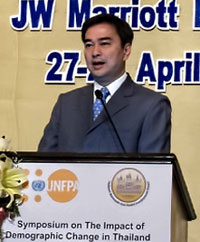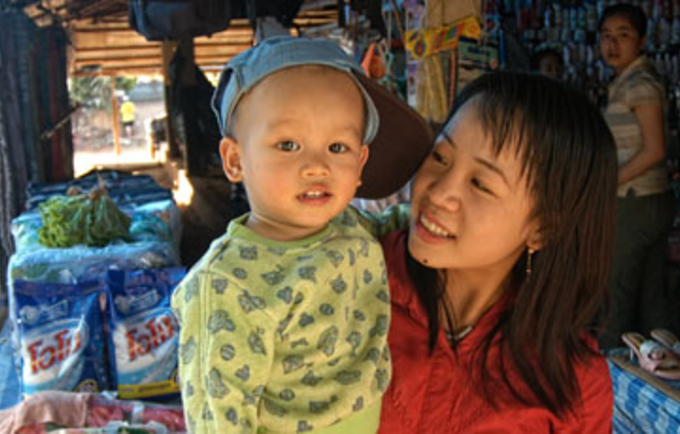BANGKOK – UNFPA Thailand, in collaboration with the National Economic and Social Development Board (NESDB), the planning body for the Thai government, organized a symposium on 27-28 April, 2011 to examine Thailand’s evolving population trends, and to analyze the impact of demographic changes on education, labour force, urbanization, migration and health. The two-day event was attended by local government officials and civil society groups from 16 countries across the region, as well as experts in demography, economics, health and social sciences.

Prime Minister Abhisit Vejjajiva, opened the symposium, saying: “We live in a time of rapid change and this [event] is particularly timely for Thailand as the country is experiencing fundamental demographic change.”
According to the report “The Impact of Demographic Change in Thailand”, which was also launched during the symposium, Thailand is entering a new era of slow population growth and its population decline is likely to set in before 2020. The report explains that the country’s fertility rate has been below replacement level for 20 years and is continuing to fall. It was found that between 1970 and 1990, the total fertility rate went down from 5.5 to 2.2 – the fastest decline over the period in Southeast Asia.
“We need to do something to cope with it,” told Professor Noriko Tsuya from Keio University of Japan. “Drop in fertility rate, once below replacement level, is difficult to reverse. Once population decline starts, you can’t just stop it that easily.”
Although Thailand’s population size is not expected to change greatly over the next two decades, it is the country’s changing population structure that is emerging as an issue of critical importance – changes in age, education and skill structures, state of health, and geographical distribution. The report warns that the country’s elderly population will grow very rapidly. It is estimated that after 2020, the only section of the population that is expected to be growing is the population aged over 45, and after 2040, only the population aged over 65 – and this is worrying civil society actors and experts.
“Definitely this would have a huge impact to the country’s workforce,” said UNFPA Representative Najib Assifi, referring to Thailand’s rapidly ageing population. “Thailand is developing so fast. There are lots of investments made here. The country exports a lot of products abroad. [With Thailand’s birth rate dropping to startlingly low levels], who will run the factories in the future?”
Editor of the report, Professor Gavin Jones, said, “Thailand needs to learn from other low-fertility Asian countries”. Taking into account other countries’ experience in seeking to raise its fertility rate, he urged the Thai government to consider several pro-natalist policies. “Thailand should now introduce a set of measures to facilitate raising of children like paid maternity and paternity leaves, flexible working hours, eldercare, improved subsidized childcare, and tax incentives or baby bonus schemes.”
Though raising the fertility rate is in the national interest, “the well-being of those wishing to avoid unwanted births should remain an important goal,” emphasized Arkhom Termpittayapaisith, Secretary General of NESDB. “The issue of teen pregnancy has clearly emerged in the recent years and this would have an affect to the quality of families and children. I think, we need also to educate the population on the right age to have a baby.”
“All these policies are actually necessary,” said Prime Minister Vejjajiva. “The Thai government is putting these policies in place, and hope [these measures] will meet the challenges posed by demographic change. Certainly it is not easy to predict the exact demand arising from population change, but certainly, we are making preparations,” he said in conclusion.
For more information, please contact:
Viennarat Chuangwiwat, tel. +66 2 687 0132, chuangwiwat@unfpa.org
Philip Nalangan, tel. +66 2 687 0124, nalangan@unfpa.org




